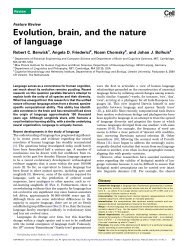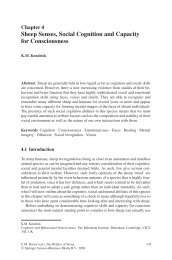Ulric Neisser
Ulric Neisser
Ulric Neisser
Create successful ePaper yourself
Turn your PDF publications into a flip-book with our unique Google optimized e-Paper software.
perhaps not even overtly, but with feeling. Hans and Charlotte had foreign accents, scholarly<br />
interests, European cultural values, academic friends. I would have none of all that; their ways<br />
were not for an American boy like me. This deliberate rejection was successful, and I became<br />
100% American in thought and deed. But success came at a price: not wanting to have anything<br />
to do with grown-up culture, I essentially wasted my adolescence. It is in high school that kids<br />
begin to read novels, play instruments, write poetry, form political identities, fall in love. I did<br />
none of those things. I never even went to New York City, which was only an auto-plus-subway<br />
ride away from Floral Park. In later years I have tried to catch up on what I missed in<br />
adolescence, but I'm still a bit behind.<br />
Another factor may also have been important. I knew myself to be a smart kid, but my<br />
father the German-educated professor was even smarter. On one occasion when a school<br />
assignment required looking things up, I asked my mother why we didn't have an encyclopedia<br />
in the house as other families did. Her answer was simple: "Because your father knows<br />
everything." (Half a century later, I'm still not sure if she was joking.) One way to avoid that<br />
particular competition was to stick to things outside Hans <strong>Neisser</strong>'s expertise - baseball, for<br />
example.<br />
In many other ways, however, it was a good life. As the spoiled younger brother of an<br />
older sister, I was indulged and rarely criticized. My parents never tried to indoctrinate me in<br />
anything. On the contrary: for some reason that I don't yet understand, they were surprisingly<br />
reticent. This was the 1940s, and yet there were no discussions of socialism, communism, and<br />
democracy in our house. Did I just not listen? Whatever the reason, I grew up with almost no<br />
views on such matters. An even stranger example concerns the Nazi persecution of the Jews,<br />
which had determined the course of our own lives. To the best of my recollection, we never<br />
talked about it. One consequence of this silence was that I didn't even know my father was<br />
Jewish! Thus I also didn't know that I was Jewish myself (at least by the Nazi criteria), and that I<br />
would surely have ended in a concentration camp had we not left Germany. This seems an odd<br />
thing not to know, but to the best of my recall I learned it only years later, in reminiscent<br />
conversations with my mother.<br />
In contrast, I knew quite a lot about my mother. Although she had rejected Catholicism in<br />
her youth, Lotte still retained a strong religious sensibility. (Perhaps for that reason, my sister<br />
and I were formally christened just before our Atlantic voyage.) Once settled in America she<br />
became a Presbyterian, joining a church in Swarthmore and then another in Floral Park. To<br />
please her I joined them too, though I was fairly dubious about the God hypothesis. My father<br />
never accompanied us to church; I took it for granted that he was some kind of non-churchgoing<br />
Lutheran.<br />
As far back as I can remember, it was assumed that I would become a "scientist." Where<br />
this strong conviction came from I do not know; certainly not from knowledge of science itself. I<br />
had a chemistry set, but was never very interested in it. The science courses at Sewanhaka were<br />
not exciting. Popular accounts of Einstein's theory of relativity were available, but I had no real<br />
grasp of it. In my senior year I read up on atomic bombs and nuclear fission as part of a science<br />
competition, but was quite aware that I didn't really understand the material and unsurprised<br />
when I failed to win. As for psychology, I don't think I had ever heard of it.<br />
Senior year was marked by the acquisition of a first girl friend; we smooched in a clumsy<br />
sort of way, but I was still socially awkward. Soon it was time to apply to college: Harvard was<br />
my first choice. I took the SAT and the Miller Analogies Test, getting a perfect score on the<br />
latter. I applied to the Harvard Club of Long Island for support, and was interviewed by the radio<br />
3




